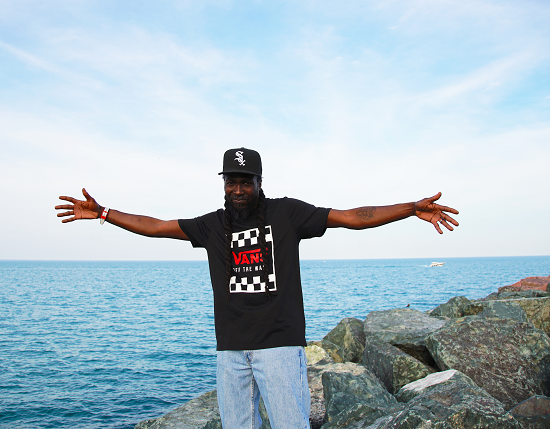Photo by Will Glasspiegel
In the eight years since Planet Mu released Legacy, the debut album by RP Boo, the Chicago artist has gone from being a cornerstone of the city’s footwork scene, repped by fellow pioneers like DJ Rashad, to becoming internationally recognised as the sound’s founding father. Starting out as a kid enraptured by 80s Chicago radio, disco and funk, then hip hop and house, he was a dancer in one of the city’s many competing crews before evolving into the DJ for House-O-Matics, a group renowned for their flair. A next step into production, tutored by legendary ghetto house producer DJ Slugo, produced 1997’s ODB-sampled ‘Baby Come On’ – the track many consider the ground zero of footwork. Raw and repetitive, stuttering, skeletal drum machine beats accentuating the rhythms of a new generation of dancers, it opened a new chapter in Chicago’s pioneering history.
Established!, Boo’s third album for Planet Mu, emphatically embraces this respect while continuing to put a distinctive spin on footwork’s hyperactive form. His Baker’s Dozen underlines the influence of his environs and Established! provides a further window into this world with samples of Bill Duke’s menacing detective in Menace II Society, the sensual funk of Barry White’s ‘I’m Gonna Love You Just a Little Bit More Baby’ and Phil Collins’ defiant ‘I Don’t Care Anymore’ amongst the sources chopped and repurposed. His own distinctive vocals, meanwhile, simmer with resonance, ‘Haters Increase The Heat’ coming across as footwork battle track-cum-personal philosophy, the disbelieving cries on ‘Oh!’ as much in reaction to the world as any dance moves being thrown down to it.
It’s a landmark for Boo, but also signals a high watermark for the sound he’s spearheaded. ‘Another Night To Party’, the closing track, has him riffing on Class Action’s 1983’s anthem ‘Weekend’, now a footwork standard. It’s a personal call-back, intentional or otherwise, to ‘Dark Knights’, an early incarnation of the same idea that opened Dude Off 59th Street, his 2007 mixtape. But it’s also a historical ripple from foundational Chicago house DJ Farley Jackmaster Funk, who was the first person Boo heard play the acappella on influential local station WBMX.
This lineage hangs heavy. Opener ‘All My Life’ has Boo narrating his love of dancing, his usual 150bpm tempo simmered down to a deep house beat. It’s a reminder that the city’s 90s house scene, and the increasingly tough sound of ghetto house, laid the foundation for footwork. Despite not making his tracklist, Boo cites the huge influence of Dance Mania legend Paul Johnson – who, unbeknown to us, had sadly died the day we spoke – and DJ Rush, both huge presences. Jammin Gerald, he mentions, another Chicago ghetto house mainstay, still has a synth on loan from 2014.
While Boo and footwork are the contemporaneous point of this continuum, album track ‘Beauty Speaks Of Sound’ draws its roots back to long before the stirrings of house or even disco, casting its gaze far beyond Chicago. The last track to be written for the album, and another that explores slower tempos, the narration has Boo dancing again, but this time on ‘the grasslands of Africa’. It’s a vision that evokes a primal energy still at play and an indomitable black spirit and pride that has him declare: “I’m beautiful, they call me music.”
After almost five decades, in some ways he’s just getting started. In conversation he speaks with a mix of quiet assurance and wide-eyed enthusiasm, talking excitedly about using his position to help others. “I’m blessed to be a student that’s still learning,” he adds at one point, telling us his father is still touring as a live musician. Whatever lies around the corner, it seems destined that the man christened RP Boo won’t stop playing – or making – records.
To begin reading RP Boo’s Baker’s Dozen, click the image of him below


